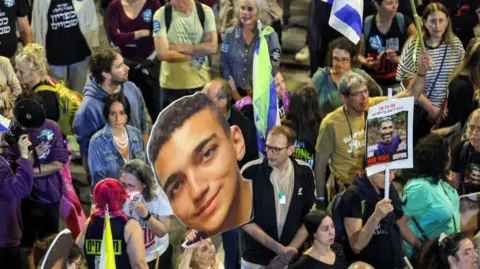Hamas, the militant Palestinian group, has announced its plan to release Israeli-American hostage Edan Alexander as part of broader efforts aimed at securing a ceasefire agreement in Gaza. This development follows a series of negotiations with U.S. officials, reflecting the complexity and ongoing nature of the conflict in the region.
Edan Alexander, a 21-year-old soldier, holds the distinction of being the last known American hostage remaining in Gaza. His release is significant, particularly in the context of the ongoing humanitarian crisis as both sides seek negotiation pathways. A senior official from Hamas disclosed to the BBC that talks with a U.S. administration representative in Qatar have been ongoing, ostensibly centered around achieving a truce and easing humanitarian access to the besieged territory.
The Israeli Prime Minister’s office confirmed that they had received information from the U.S. regarding Hamas’s intention to release Alexander. This announcement appears to signal a possible thawing in hostilities, or at least an attempt by Hamas to extend an olive branch as President Donald Trump prepares for his visit to the Middle East. According to a Palestinian official familiar with the talks, the anticipated timing of Alexander’s release may serve as a goodwill gesture ahead of Trump’s arrival.
However, the path to Alexander’s release is fraught with conditions. Reports indicate that any transfer would necessitate a temporary cessation of Israeli military operations to ensure the safe handover. Alexander was captured during a brutal Hamas attack on October 7, which led to extensive casualties. Born in Tel Aviv and raised in New Jersey, his case has become emblematic of the hostages taken during the 2023 assaults, of which 59 still remain in captivity in Gaza.
The situation remains dire, with Hamas asserting that the release is part of their broader commitment to achieving a ceasefire, which would allow for the entry of vital humanitarian supplies such as food and medicine. The Israeli government has acknowledged this gesture but also stressed that it intends to maintain pressure on Hamas to secure the release of further hostages. Israeli officials have stated their commitment to achieving all of their war objectives, indicating that negotiations around further releases would not come at the expense of military aims.
President Trump’s impending visit adds another layer of complexity to these negotiations, with Israeli authorities indicating a willingness to expand military operations against Hamas if favorable conditions are not met by the end of Trump’s trip. There are reports of plans to seize territories more extensively, which would raise concerns over forced displacements of Palestinian residents and complicate humanitarian efforts in the region.
The conflict has seen escalating violence, evidenced by the death toll that has reached staggering numbers. Reports from the Hamas-run health ministry suggest an alarming figure of over 52,800 Palestinians killed since the onset of the latest military campaign, with accompanying humanitarian crises intensifying as food and medicinal supplies are blocked from entering Gaza. The UN has reported thousands of children suffering from acute malnutrition, and prices of basic necessities have skyrocketed, with inflation measures indicating increases as high as 1,400%.
Amidst this backdrop, the complexities of hostage negotiations, military objectives, and humanitarian needs create a challenging landscape for all parties involved. The discussions taking place reveal the fragility of peace in the region, as any misstep could exacerbate the ongoing suffering of civilians trapped in the crossfire. The situation continues to unfold, with the world watching as both sides grapple with the dire consequences of this prolonged conflict and its impact on regional stability and international relations.



